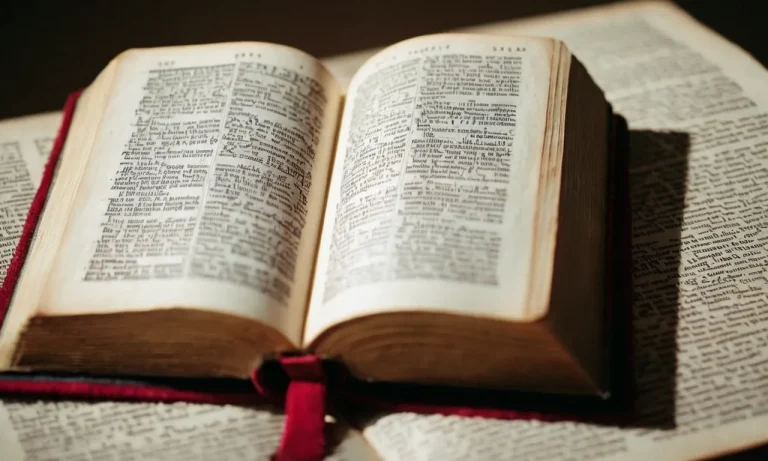Why Was King David So Special To God?
King David is one of the most important figures in the Bible and Jewish history. He was a strong military leader who united the 12 tribes of Israel, establishing Jerusalem as his capital. David was also chosen by God to be the ancestor of the Messiah.
If you’re short on time, here’s a quick answer to your question: King David was so special to God because of his deep faith, his poetic worship, and because God chose him to continue the lineage of Jesus Christ.
In this approximately 3000 word article, we will examine King David’s life and legacy in depth to understand the qualities that made him so beloved by God.
David’s Humble Beginnings
Shepherd boy called by God
David was the youngest son of Jesse from the humble town of Bethlehem. As the youngest son, David was tasked with caring for his father’s sheep out in the fields. This was not an easy job, as he had to protect the sheep from wild animals and thieves.
However, David embraced his role as a shepherd boy and developed a deep faith in God. According to the Bible, God saw the sincerity of David’s heart and chose him to become the future king of Israel.
One defining moment came when the prophet Samuel was guided by God to visit the household of Jesse and anoint one of his sons as the next king. As Jesse presented his other sons who seemed qualified based on appearance and stature, God told Samuel that He looks at the heart, not outward appearance.
When David was called in from the fields tending the sheep, God confirmed he was the one to be anointed. Despite his humble beginnings as a shepherd boy, David was designated for an extraordinary calling. This demonstrated how God often chooses the unexpected ones to carry out His purposes.
David and Goliath
Another pivotal story from David’s early life is his battle against the Philistine giant Goliath. At this time, David was still a young shepherd boy who had been brought to the Israelite camp mainly to deliver food to his brothers who were soldiers.
However, when David heard Goliath taunting the army of Israel, he was incensed at this affront to God’s people.
Despite just being a youth with a slingshot and staff, David volunteered to fight Goliath in single combat. Demonstrating incredible courage and faith, David charged at the heavily armed and experienced warrior Goliath.
With unerring aim, David’s slingshot stone struck Goliath in the forehead, bringing the giant crashing to the ground. David then used Goliath’s own sword to finish him off. This astonishing victory made David a national hero overnight.
More importantly, it cemented David’s faith that God would help him overcome any obstacle or intimidating foe.
From battling lions and bears while protecting his sheep to toppling the giant Goliath, David’s early experiences as a humble shepherd boy prepared him well for the challenges ahead as king. His heart was fully devoted to God, and he learned to trust in divine providence.
David’s beginnings demonstrate that God equips those He calls, using our humble obedience in little things to prepare us for greater purposes.
David’s Faith and Trust in God
David relied fully on God
King David had immense faith and trust in God throughout his life. Even as a young shepherd boy facing the giant Goliath, David declared that the battle belonged to the Lord (1 Samuel 17:47). When David became king, he continued to rely on God rather than his own wisdom or strength.
For example, David sought the Lord’s guidance before going into battle (2 Samuel 5:19). He had confidence that God would give him victory over Israel’s enemies. David’s psalms overflow with expressions of faith in God’s power, protection, and provision.
“The Lord is my rock, my fortress and my deliverer” (2 Samuel 22:2). Even when David sinned greatly, he threw himself upon God’s mercy and grace, trusting the Lord to forgive him (Psalm 51). Though far from perfect, David had a heart inclined towards complete dependence on his Creator.
God delivered David from Saul and enemies
Throughout his life, David experienced God’s protection and deliverance from those who sought to harm him. As a young man, David was anointed by Samuel to be the next king of Israel. This made Saul jealous and he tried multiple times to kill David.
But God preserved David, even miraculously directing Saul’s spear to miss and pin David to the wall (1 Samuel 18:11). The Lord allowed David to evade Saul’s pursuit and eventually become king after Saul’s death. As king, David faced many enemies like the Philistines.
Yet God gave him great military victories, including over the giant Goliath. The Lord promised that He would cut off David’s enemies (Psalm 89:23). Even when David sinned with Bathsheba, God did not abandon His servant but maintained His covenant of protection.
David frequently praised God in song for being his “rock of refuge” and deliverer (Psalm 18:2).
David’s failures and repentance
Though David was a man after God’s own heart, he still failed at times and gave in to temptations. His most grievous sins were committing adultery with Bathsheba and then having her husband Uriah killed in battle to cover up the affair.
The prophet Nathan confronted David, who was immediately struck with the gravity of his sins. David’s sincere prayer of confession in Psalm 51 shows his deep remorse over his actions and desire for God’s forgiveness and renewal.
While there were consequences for his sins, the Lord did mercifully restore David when he repented. Throughout his reign, David had to guard his heart against pride and self-sufficiency. But after failures like counting his fighting men in disobedience to God (2 Samuel 24), David demonstrated humility and repentance.
He was quick to acknowledge his sins, mourn over them, and turn back to the Lord. David’s life proves that God forgives even grievous sins when we genuinely repent.
David’s Skills and Accomplishments as King
United Israel and conquered Jerusalem
After Saul’s death, David became the king of Judah and united all 12 tribes of Israel under his rule with Jerusalem as his capital. This was a monumental accomplishment as Israel had been a divided nation since the reign of Ishbosheth after Saul’s death.
David captured the Jebusite city of Jerusalem around 1004 BC and made it his capital, as it was strategically located on key trade routes. Jerusalem became the political and spiritual center of Israel for the first time in history under David’s reign.
Successful military strategist and leader
David was an exceptionally gifted military strategist and leader. He led Israel to many decisive victories over the Philistines, Moabites, Edomites, Ammonites and other nations, expanding Israel’s borders. Some key successes include:
- Defeating the Philistines and capturing their chief city of Gath
- Conquering the Edomites and stationing garrisons throughout Edom
- Defeating the Ammonites and capturing their capital city of Rabbah after a year-long siege
David was aggressive in battle but did not lose a single military encounter, making Israel the dominant power in the region. His military achievements secured Israel’s borders and ushered in an era of regional peace and prosperity for his people.
Made Jerusalem the political and spiritual capital
David transformed Jerusalem into the political, religious and cultural center of Israel. He built a palace there and had the Ark of the Covenant brought to Jerusalem, wanting to centralize worship of God in the city. Solomon later built the grand Temple there by David’s instruction.
Jerusalem became the place where God chose to put His Name and manifest His presence (1 Kings 11:36). David organized the priests and Levites for Temple worship and wrote many Psalms in Jerusalem. His descendants ruled there for over 400 years.
By making Jerusalem his capital, David greatly strengthened Israel’s unity and helped establish Judeo-Christian heritage in the city that continues today.
David’s Passion for Worshiping God
As a gifted musician and prolific songwriter, David composed around half of the book of Psalms in the Bible. Through these soulful poems and lyrics set to music, David poured out his heart in worship of God.
The Psalms express the full range of human emotion – from exuberant praise and thanksgiving to grief, despair and repentance. David had an intimate and authentic relationship with God.
Gifted musician and songwriter
David was a highly skilled harpist and lyre player from a young age (1 Samuel 16:14-23). He would play to soothe King Saul’s tormented soul. Later as king of Israel, David organized choirs and musicians to perform and worship in public ceremonies (1 Chronicles 15:16-24).
The melodies and lyrics he composed, with inspiration from the Holy Spirit, became seminal, cherished works.
Composed many Psalms
The book of Psalms comprises religious poetry and hymns meant to be sung during public and private worship. Over 73 Psalms include attributions to David as author in their titles. These contain heartfelt words directed toward God Himself.
Themes deal with trusting God in adversity, repenting from sin, praising God’s sovereignty and goodness, finding refuge in Him alone. Jesus even quoted the Psalms on the cross.
Danced joyfully before the Ark of God
When David successfully returned the Ark of the Covenant to Jerusalem, he celebrated with energetic dancing and music in the streets with all the Israelites (2 Samuel 6:12-15). His first wife Michal scorned him for this public display.
But David felt no shame because he was rejoicing sincerely for God, his true audience. We too can follow David’s example to worship God with abandon, no matter who may be spectating.
In his fierce, wholehearted passion to connect with God, David fulfilled his life’s purpose. Despite profound failures, he strove to align himself back to what mattered – pursuing God’s own heart. Therein lies David’s legacy which still touches us through his honest, poetic writings.
God’s Everlasting Covenant with David
God promised David an everlasting dynasty
One of the most significant events in King David’s life was when God made an everlasting covenant with him, promising that his throne would be established forever. This covenant is recorded in 2 Samuel 7, where God sends the prophet Nathan to tell David:
“When your days are fulfilled and you rest with your fathers, I will set up your seed after you, who will come from your body, and I will establish his kingdom. He shall build a house for My name, and I will establish the throne of his kingdom forever.” (2 Samuel 7:12-13)
This was an amazing promise, that someone from David’s lineage would rule over God’s people forever. While David had wanted to build a temple for God, God instead promised to build a “house”, or dynasty, for David. His throne would be established forever.
This covenant revealed God’s special favor on David. Though David was far from perfect, God chose him and promised to one day raise up his descendent Jesus to rule eternally over God’s kingdom. This promise to David was repeated in several other passages, like 1 Chronicles 17:11-14 and Psalm 89:3-4.
Jesus descended from the house of David
The fulfillment of God’s covenant with David begins with the coming of Jesus Christ. As the angel Gabriel told Mary:
“He will be great, and will be called the Son of the Highest; and the Lord God will give Him the throne of His father David. And He will reign over the house of Jacob forever, and of His kingdom there will be no end.” (Luke 1:32-33)
Jesus was born into David’s family line, as both Matthew and Luke’s genealogies make clear (Matthew 1, Luke 3). As the adopted Son of Joseph, who was himself a descendant of David, Jesus fulfilled the prophecy that the Messiah would come from David’s line.
During Jesus’ ministry, the crowds recognized Him as the “Son of David” (Matthew 9:27, 12:23). After His resurrection, Peter also proclaimed that God had fulfilled His promise to David through Christ (Acts 2:29-32).
Yet the complete fulfillment of God’s covenant with David awaits the second coming of Christ. When Jesus returns, He will establish David’s throne forever in the city of Jerusalem, ruling over the whole earth in righteousness and justice (Isaiah 9:7, Daniel 7:13-14).
King David looked forward to that day, and trusted that God would keep His covenant promise.
Conclusion
In summary, King David was so treasured by God because of his uncompromising faith, skillful leadership, joyful worship, and divine selection to carry forward the lineage of Christ. Despite his flaws, David sought God’s heart above all else.
His awe of God, poetic Psalms, and legacy as Israel’s greatest king made him an ancestor worthy of the coming Messiah.








